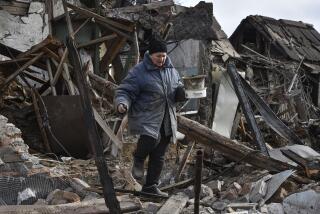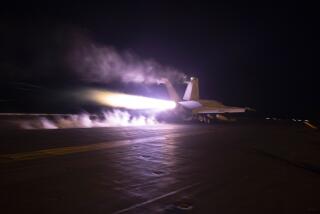No-Fly Policy on Target
- Share via
For more than two months the no-fly zones over northern and southern Iraq have been arenas for almost daily attacks on Saddam Hussein’s air defense system by U.S. and British planes. The bombing campaign shows no signs of diminishing. So long as Iraq chooses to challenge the allied patrols with its planes or surface-to-air missiles, retaliation is a certainty. The need to maintain these patrols can hardly be argued. The no-fly zones were created to protect the largely anti-government Kurdish population in the north and the Shiite Muslims in the south from the kind of brutal air attacks Hussein carried out against them in the wake of the Gulf War. The allies are not likely to abandon that humanitarian purpose, nor should they.
But the recent intensification of the attacks on Iraq’s air defenses has taken on a steadily stronger political dimension. By not limiting themselves to tit-for-tat responses, by expanding their targets beyond the missile launchers and radars that pose an immediate threat, the allies are exposing the ineffectiveness of Iraqi antiaircraft defenses and embarrassing its military. If Hussein is ever to be overthrown, the Iraqi military will have to play the dominant role. A number of recent high-level shake-ups indicate that Hussein is blaming his generals for the punishment that his own miscalculations incited. That can only increase resentment against him.
The Pentagon, as Times correspondent Paul Richter reported this week, has decided to downplay the air campaign: no TV pictures of bombs hitting targets, no damage assessments, no estimates of how much of Iraq’s air defense system has been destroyed. This low-key approach is an effort to avoid drawing fresh attention to the cooperation provided by Turkey, Kuwait and Saudi Arabia, where some of the allied planes are based. Notably, Turkey has expressed its unhappiness after one attack this week temporarily shut down a pipeline that carries Iraqi oil across Turkey and provides an important source of revenue to the Turkish government.
How long the air campaign goes on is largely up to Iraq. If it returns to passively accepting the no-fly zones, the bombing will come to an end. If the regime keeps trying to shoot down allied planes, it can count on sacrificing more of its air defenses. The no-fly zones protect millions of Iraq’s citizens. The planes that patrol them can do their job only if free to defend themselves.
More to Read
Sign up for Essential California
The most important California stories and recommendations in your inbox every morning.
You may occasionally receive promotional content from the Los Angeles Times.













